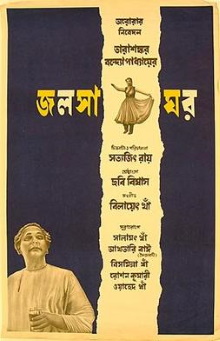Indian cinema is underrepresented here as the country generally is not thought to produce great films especially in the modern era. Yet it would not do to skip over this particular title, a film that was far ahead of its time and underappreciated in India itself when it was released but achieved great international success and is now regarded as one of the greatest films of all time. It is certainly difficult to imagine any film that better encapsulates the conflict of old money versus new money and the passing of the aristocratic era.
This film depicts the final days of a line of zamindars in Bengal, landowners who effectively act as rulers of their individual fiefs. Biswambhar Roy is a landlord who steadfastly holds to the ancient traditions even as his land holdings has diminished due to flooding, soil erosion and changing government rules. He loves music and as such the music room where he hosts concerts for guests is the most beautiful and prized part of his palace. One of the commoners nominally under his rule is Mahim Ganguly. Roy dismisses him as a son of usurers but he is rapidly growing rich from business dealings and being willing to adopt modern technology. Though Ganguly does not directly challenge Roy’s status, Roy is still annoyed by news of his new, big house, his importing of electrical generators and motor vehicles and even unfamiliar music from Europe. To maintain his prestige, he insists on throwing lavish concerts against the advice of his wife and his steward, even though he has to sell the family jewels to pay for them.
The premise alone would make this film a delight and the execution here is nothing short of sublime. It sets up shots and scenes so patiently that it would just about count as a slow film. It uses very sparse dialogue to convey what is going on, yet there is never any confusion as to what is going on. Roy’s love of music shines through as we get full scenes of the dance and music performances he commissions. Even without the cultural context to fully appreciate them, these are wonderful to watch and even though this is all filmed in black and white, the sheer luxury and opulence of Roy’s music room comes across perfectly. Roy’s signature style of lounging on a cushion with a hookah pipe in his hand is simply indolence made manifest. We only need to take one look at him to instantly understand his character and his place in the world, no exposition required at all. It’s no wonder that this is now considered to a masterpiece of cinema.
It’s such a pleasure to watch a film that is so confident about relying on visuals alone to convey the story. At no point in the dialogue does Roy need to say that he disdains using modern technology imported from the West, it is enough for us to watch his reaction as a lorry marked with Ganguly’s name drive past his palace. Similarly the decay and neglect of his palace is plain for all to see as is the fact that by the end he has only two servants left in his employ. As such no exposition is needed to explain how society has moved on since the glory days of the zamindars or that the traditional Indian music that Roy so enjoys is inextricably bound up in the patronage system of the aristocracy. There’s so much tied up in here, Roy’s insistence that no matter how much money Ganguly makes, it still won’t make up for his inferior blood, the extreme servility with which even Roy’s son and wife must greet him, his reverence for his ancestors and so on and this film perfectly captures all of that.
Finally this film earns extra points for me by being about a setting and themes that I didn’t know anything about. It is so great to watch films that truly are rooted in their unique cultures and not just transposed versions of universal stories familiar to everyone. Furthermore this film refrains from the obvious route of painting anyone as villains. Roy is misguided, woefully behind the times and ultimately doomed, yet the film shows him as a relatively benign landlord, at least to the extent that his social role permits him to be. Similarly Ganguly is well aware that his wealth far eclipses that of Roy and would like Roy to acknowledge this change in status, but he is not obnoxious about rubbing it in Roy’s face. Not only is this film a true masterpiece, I suspect it is also a valuable piece of the historical record.
